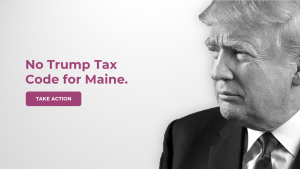UPDATED: This blog post was updated on February 5, 2018, to reflect the latest analysis from Maine Revenue Services.
This year, state legislators will face so-called “tax conformity” proposals that give them a clear choice: Will Maine enact the same disastrous, lopsided policies enacted by Congress with the Trump Tax Plan, or will we create our own path toward a tax code that meets the needs of all Mainers?
What is tax conformity? Who does it affect? And why is it bad for Maine? Here’s what you need to know.
The Trump Tax Plan was already enacted by Congress. What’s left to be decided by Maine lawmakers?
Simply put, the Maine Legislature must decide whether to change Maine’s tax code to mirror the harmful changes made at the federal level by enactment of the Trump Tax Plan.

Mainers pay income taxes at the state and federal level. In some parts of Maine’s tax code, state lawmakers have decided over the years that rather than craft our own set of tax laws, the state would simply mirror federal law. In those instances where state law mirrors federal law, Maine’s tax code is said to “conform” with the federal tax structure.
But tax laws at the federal level change. In December, Congress passed the Trump Tax Plan, a $1.5 trillion restructuring of the federal tax code that provided huge giveaways to corporations and the wealthiest households in the country, paid for in part by future tax increases on the bottom 80 percent of households.
Because of these changes, Maine lawmakers will face a choice whether to continue conforming to the portions of the federal tax code that were changed by the Trump Tax Plan. In other words, will we create our own state-level giveaways to match those signed into federal law by President Trump’s? The governor is expected to introduce a tax conformity bill to the Legislature in the coming weeks.
It’s important to note: “Tax conformity” does not create a tax policy autopilot. That means Maine is not obliged to replicate federal tax policy. There are plenty of examples where Maine’s tax code differs from the federal government’s. Lawmakers always have the choice to conform to particular provisions of the federal tax code, or not.
What would happen if lawmakers choose to adopt the Trump Tax Code in Maine?
We know which parts of our tax system are vulnerable to changes caused by the Trump Tax Code. Here are a few examples of what would happen if lawmakers choose to adopt the Trump Tax Code in Maine:
- The elimination of the personal exemption would mean a tax increase on nearly every Maine family. If lawmakers adopt the Trump Tax Code in Maine, they would raise taxes on Maine families by eliminating the personal exemption. Before the Trump Tax Code, the federal personal exemption enabled families to reduce their taxable income by $4,150 for each family member. This tax benefit provides real economic relief for working families. The Trump Tax Code eliminates the exemption at the federal level. Because Maine’s personal exemption mirrors the federal code, Maine families will see their state income taxes go up by an average of $323 if lawmakers accept the Trump Tax Code’s elimination of the personal exemption.
- Additional provisions of the Trump Tax Code would create new state-level giveaways for a handful of wealthy families. Only about 20 Maine households a year pass on enough wealth to owe any estate tax under current law. If lawmakers adopt the Trump Tax Code, Maine would double the estate tax exemption, giving wealthy families up to a $22 million “free pass” from paying their fair share of the estate tax. That giveaway to fewer than two dozen powerful households a year would cost the state $8 million annually, compromising needed public resources for Maine families and communities. Just imagine how many schoolbooks for Maine students could be bought with $8 million.
- Changes in a program known as “bonus depreciation” would expand loopholes for corporations that prioritize capital investments over jobs. Conformity with the Trump Tax Code would needlessly extend a failed tax credit for businesses to the tune of $20 million a year. Maine lawmakers created the Maine Capital Investment Credit (that’s the bonus depreciation program at the state level) to provide temporary stimulus to corporations during the worst period of the Great Recession. The program has proven ineffective at creating economic growth, and instead incentivizes companies to make capital investments they may not even need just to get a tax break. Today, the program is little more than a loophole, allowing companies with accounting savvy to game the tax code for profit.
These are just a few of the potential effects of bringing the Trump Tax Code to Maine. Until we see the detailed language of this year’s tax conformity bill proposed by the governor, we won’t be able to paint the full picture.
But the stakes are clear: Conformity has the potential to shift tens of millions of dollars away from public services that benefit all Mainers, in favor of benefits for a few small constituencies, such as corporations and very wealthy households.
Your elected officials need to hear from you
Maine’s tax code should be crafted carefully with the interests of all Mainers in mind. Your elected state officials have a decision to make, and they need to hear from you.
The Trump Tax Code isn’t just bad policy. It’s also very unpopular. That’s because people understand that when the tax code is manipulated to provide huge benefits for a small number of people and corporations, everyone else suffers the consequences of underfunded public services. Every dollar squandered — whether as tax breaks for hugely profitable corporations such as Apple or Walmart, or as handouts to the top 1 percent of households — is a dollar not spent in our children’s schools, on health care for our sick and disabled neighbors, or on investments in communities that promote shared prosperity.
Mainers all chip in to pay for the things that create thriving communities, and we expect everyone to pay their fair share. So tell your lawmakers: Don’t bring the Trump Tax Code to Maine.



